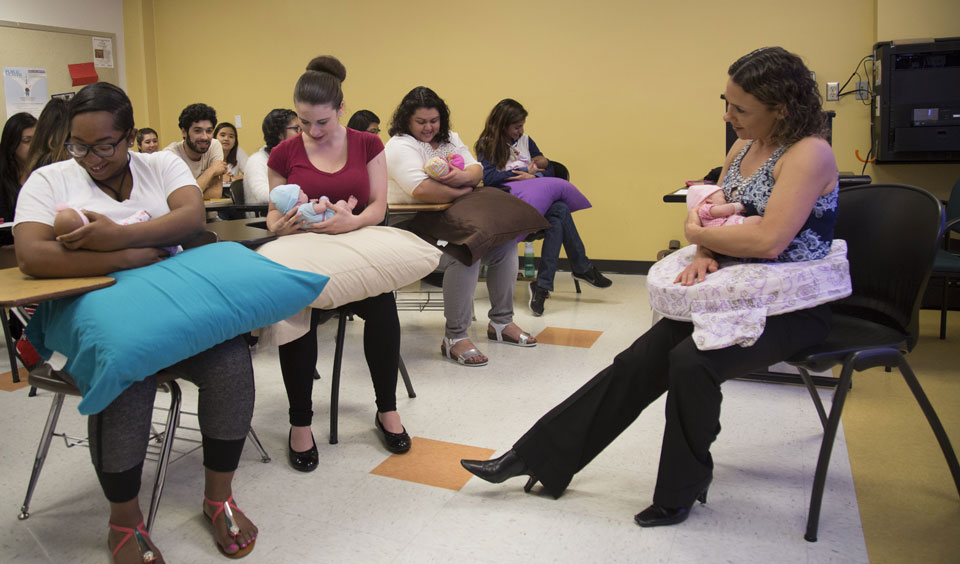CSUN Expands Its Lactation Education Curriculum with Help from Federal Grant

Health sciences professor Merav Efrat, right, demonstrating breastfeeding techniques to students in her lactation education course. A $150,000 grant from the USDA is providing the support for CSUN to expand its lactation education curriculum. Photo courtesy of Merav Efrat.
A $150,000 grant from the U.S. Department of Agriculture (USDA) is providing the support for California State University, Northridge to expand its lactation education curriculum. As a result, CSUN can now offer students all the classes, except for the clinical experience, they need to qualify to become an International Board Certified Lactation Consultant.
Northridge is one of the few universities in the United States that offers lactation educator training courses to its undergraduate and graduate students. The three-year grant from the USDA’s Pathways to Lactation Consulting for FANH Students project is designed to increase support for breastfeeding in underrepresented communities.
“There really are not enough lactation consultants to serve the number of women who are breastfeeding, particularly women from ethnically diverse communities,” said Merav Efrat, an associate professor in CSUN’s Department of Health Sciences and an International Board-Certified Lactation Consultant,who developed the university’s lactation educator training course two years ago.
“Lactation is a young and evolving field, working toward enhanced professionalism,” she said. “It makes sense that the training for professional lactation educators and consultants be housed at a university.”
The grant provides Efrat with the support she needs to develop an additional course in lactation education — lactation education during the postpartum period. The curriculum for the new course is multidisciplinary, with modules designed by several CSUN faculty from a variety of programs, including faculty in the Public Health Program; family and consumer sciences professor Angie Giordano and health sciences professor Louis Rubino. The newcourse will be piloted in spring 2019
“With the addition of this course, students here at CSUN can take all the courses they need to sit for the certification exam to become International Board-Certified Lactation Consultants,” Efrat said. “The only thing we don’t offer that students will need to complete before they are eligible to take the exam is the clinical hours assisting breastfeeding mothers. However, students wishing to complete their clinical work may do so through two different pathways outside of the university setting.”
CSUN’s lactation education curriculum started in 2010 with an undergraduate lactation educator training course and was an immediate hit. This course is open to any CSUN junior or senior. In 2016, CSUN expanded its lactation education curriculum and added a graduate lactation educator training course, which is open to any graduate student. Both courses are recognized by the international lactation accreditation agency, Lactation Education Accreditation and Review Committee (LEAARC), and are open to members of the community, space permitting.
Last year CSUN was recognized by BreastfeedLA with its Visionary Impact Award for the university’s pioneering work in institutionalizing lactation educator training courses in their undergraduate and graduate programs, and training future lactation professionals.
“We want to build on the momentum of being the recipient of last year’s BreastfeedLA Visionary Impact Award, and continue being viewed regionally as leaders in preparing diverse future lactation professionals in a university setting,” Efrat said. “This new grant will provide low-income underrepresented students with a cost-effective way to complete the coursework needed to become an International Board-Certified Lactation Consultant while simultaneously completing their bachelor’s degrees.
“When it comes to diverse communities, we need people who speak the mother’s language and understand and respect her culture,” she continued. “That’s why it’s a perfect fit for CSUN with our rich diversity of students.”
For more information about CSUN’s lactation education program, visit its website at https://www.csun.edu/health-human-development/lactation-education.

 experience
experience